
Nisar Betani
In Pakistan, when it comes to Sohan Halwa, Multan's version is widely known. However, Dera Ismail Khan's Sohan Halwa boasts a distinctive, delightful, and crisp flavor that outshines its Multani counterpart.
This culinary art has been a cherished tradition in Khan for generations, and its best practitioners continue to create this delectable treat today. Dera Ismail Khan's rich abundance of pure milk and sweet water plays a pivotal role in crafting the finest Sohan Halwa.
Crafting Sohan Halwa: An Art Transformed
Ghulam Bashir, a master of Sohan Halwa in Dera Ismail Khan, reminisces about the earlier days when Sohan Halwa was crafted using corn flour, golden wheat husks, sugar, dry fruits, milk, and other ingredients. Though the fundamental process remains the same, a transformation has occurred.
Today, there are over twenty varieties of Sohan Halwa available in various shops and markets, including sugar-free, ghee-free, coconut, almond, pistachio, and walnut-infused versions.
The Birth of Sohan Halwa: A Tale of Centuries
Another Sohan Halwa maestro, Sarhadi, unveils the rich history of this delectable treat. Legend has it that Sohan Halwa graced the royal tables during the second reign of Mughal Emperor Naseeruddin Muhammad Humayun. Yet, Dera Ismail Khan's iconic Sohan Halwa took its unique form in the 1920s and 1930s.
Also Read: Cycle Race and Walk Raise Breast Cancer Awareness in Shaukat Khanum Hospital Peshawar
As per the tale, a Hindu gentleman named Sohan Lal, originally in the dairy business, initiated the creation of Sohan Halwa in Dera Ismail Khan. By combining khoya (dried milk solids) with sugar, Sohan Lal introduced a novel confection that the public warmly embraced. With no previous name for this delectable gift, it was christened "Sohan Lal's Halwa," forever known as Sohan Halwa.
However, some elders and memoirs attribute the founding of Dera Ismail Khan's Sohan Halwa to Ustad Allah Bakhsh and his son Abdullah, who is credited with introducing Sohan Halwa in the 1930s. Regardless of the founder's name, the wheat sprouts central to the recipe give the treat its signature golden hue, earning it the moniker "Sohan Halwa."
A Sweet Tradition Thrives
This cherished tradition begun by Sohan Lal, Allah Bakhsh, or Muhammad Abdullah continues unabated today. Dera Ismail Khan is home to around 500 Sohan Halwa shops, where hundreds of thousands of rupees worth of Sohan Halwa are expertly prepared daily, each piece presented in colorful packaging. These sweet delights can be found at locations such as Bazar Kalan, Topanwala Chowk, Bannu Adda, Tank Adda, and Inner City.
Sohan Halwa has flourished into a multi-million-rupee enterprise in Dera Ismail Khan. Every day, thousands of customers indulge in their favorite Sohan Halwa at various shops across the city. This sweet delight transcends local boundaries, finding enthusiasts in Peshawar, Bannu, Bhakkar, Dera Ghazi Khan, Lahore, Quetta, Islamabad, Tank, Kohat, Rawalpindi, Karachi, and beyond, as it graces the tables of professionals and businesses.
Muhammad Inam, a resident who works in Peshawar, highlights the city's position as the provincial capital, hosting government departments and drawing individuals from all corners of the province. These visitors frequently take Dera Ismail Khan's Sohan Halwa as a gesture of goodwill to their colleagues and friends.
Furthermore, it's not unusual for people to send this delectable treat as a thoughtful gift to friends, colleagues, and family.
Modern Challenges: Threatening the Legacy
While this unique Sohan Halwa business engages thousands and sustains countless households, inflation's unrelenting rise has begun to impact the industry.
Escalating costs of raw materials, fuel, milk, dry fruits, employee salaries, and shop expenses have led to a surge in Sohan Halwa prices, resulting in reduced sales and a halt in the preparation of some varieties. Unfortunately, this inflation has also affected the overall quality of this beloved treat.